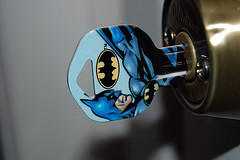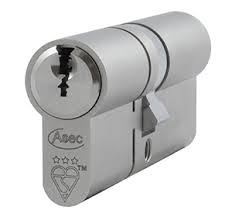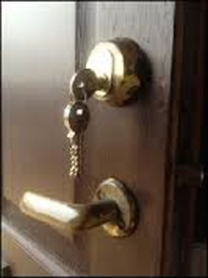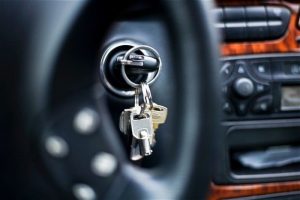Lock changes for landlords
If you own a holiday let property, you should be well aware of the new fire regulations that suddenly hit last summer. I know many of you have been spending all your profits to ensure your properties are up to scratch for the coming season.
But what about long term lets?
Well, if you read the fire risk assessment that has to be carried out by holiday let owners, it states “any property you pay to stay in.” If that doesn’t already mean long term lets, then it certainly will if the government of the day decides that the measures taking place with holiday lets are a success. After all, the more they make you spend, the more they get in tax.
If you own properties that you let out to tenants, then it might be an idea to get ahead of the curve. Locks are being changed all the time through abuse, lost keys, evicted tenants, etc. What better time than now to make sure that the new locks going in are keyless escape versions. In the event of a fire, your tenants can get out quickly without having to find keys in a panic situation?
AC Locksmiths Norfolk can change your locks for you, We will ensure that all replacements are kite marked products, so all insurances will be valid.
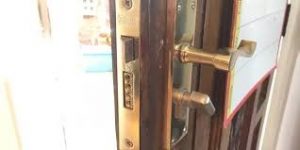
But while thumb turn (escape) locks are great for getting out easily, they can be a reduction in your security. There are tools that can go in through letterboxes and rotate the inner thumb turns, it is important to consider options to cancel this short fall. Letter catching cages are a great remedy to this, or mounting a post box outside your house, while disabling any door positioned letter plates is even better.
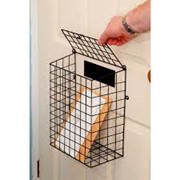
Changes are coming. I have spoken to several holiday let owners who have changed locks recently, only to have to change them again in light of the new legislation. It’s worth thinking about being ready for the inevitable.
Any questions regarding the above, please do not hesitate to contact me through any of my contact methods. https://www.ac-locksmiths-norfolk.co.uk/contact-us-here/
Thanks for reading.
Holiday let owners – are you aware of holiday let and keyless exit point regulations?
In light of the new self assessment fire regulations for owners of holiday lets, here are some things I have noticed people getting wrong:
Firstly, your front door and back door may not be the only fire escapes. If you are in a room with French doors and the fire is the other side of the interior doors, then the French doors are your exit point. Every final exit door is a fire exit and therefore every final exit door must me converted to keyless escape.
Secondly, if you have a porch, the inner door must either be converted as well or left unlockable by the customers. This can be as simple as taking away that key. Alternatively, convert the inner door and remove the key for the outer porch. Either way, the entire route must be keyless escape to meet the keyless exit point regulations.
Finally, this conversion is a serious impact on security. There are tools available that can come in through the letterbox and rotate the thumb turn/push the lever. As these are your holiday lets, I doubt you get much worthwhile mail, so either invest in a letterbox guard, letter collecting basket or seal off the letter box and put a posting box on the wall outside.
So what does the conversion to keyless exit point regulations consist of?
Well, if you have a door with a lift handle mechanism then it simply means changing your double key cylinder for a key and turn cylinder
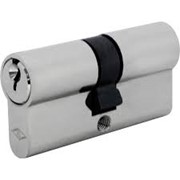
Double key cylinder
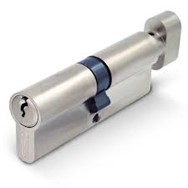
Key & turn cylinder
Prices start from £55, although I see no reason to go for high spec when you are making life easy for the burglar under these new regulations.
If you have a wooden door, you are turning this 
 into this
into this
On wooden doors, you also have the option to install a kite marked nightlatch /Yale type lock
If you need me to come and do a keyless escape conversion for you, please book a free assessment/measure up where I will give you a final no obligation quote and book you for fitting at the next convenient date. Most work can be carried out during changeover days.
Landlord lock law change:
I have just been reading through the Home Office Document: ‘A guide to making your small paying-guest-accommodation safe from fire.’ A guide to compliance with fire safety law for those responsible for safety in small paying-guest-accommodation’
You can find the document here
Note this says fire safety law and therefore is the legal requirement of all landlords, certainly for those with holiday lets. I would argue long term tenants are also paying guests as they have no right to remain when a landlord decides they want their property back for any reason.
Speaking to a letting agency recently, I have also discovered that it will be expected of all landlords to read the document and comply with all points mentioned. You won’t always get a risk assessor to check things for you. You, as the landlord are entirely responsible should a fire break out. It is quite heavy reading and most of it is obvious, but it is my job to point out relevant issues to my own line of work.
In section 6, there is this statement:
‘Exit doors, such as the front or back door, should always be easy to unlock and must not need a key to unlock them from the inside. A simple latch or thumb turn is usually good enough. However, you may need to consider whether all guests are able to open these doors. A simple single action turn handle or lever will often be more appropriate.’
This means you must have a lock with a thumb turn on the inside. Something like this:
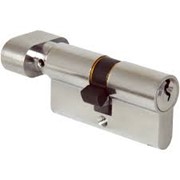
On all upvc type doors, this is simply a matter of changing the cylinder. On doors with mortice (often called ‘Chubb’ type) locks, you will need to change the lock, handles and purchase a cylinder. And while thumb turns are great for fire escapes, they do pose a security risk as it is possible with certain tools to go in through the letterbox and rotate the thumb turn to gain access. Therefore any locks with thumb turns on a door with a letter plate, should also purchase a letter plate guard to alleviate this problem.
The point is repeated on the checklist included in the document: ‘Are frequent checks carried out to ensure exit routes are kept clear and fire exits remain easily openable?’
That is your prompt to make sure no one can lock a door, remove the key and then be unable to get out while panicking in a fire.
October the 1st is the current date for this to become law over advice.
If you have your work done through AC Locksmiths Norfolk, you can expect to pay £55 for a kite marked thumb turn euro cylinder. These can be brass/gold, chrome, polished chrome, dual finish, black or white. An average of £50 to replace your mortice lock with a mortice euro lock case. Handles start at £25 but average at £45. More ornate handles such as wrought iron up to £200. In all cases, a labour fee of £75 is payable. (All prices correct at time of writing, but please get binding quote at measuring stage). In almost all instances, a measuring visit will be required. This is free to all properties within a half hour drive of Holt, Norfolk.
Should you have any questions regarding the above information, please do not hesitate to contact me; 07846643176
Thanks for reading.
New laws implemented for holiday lets
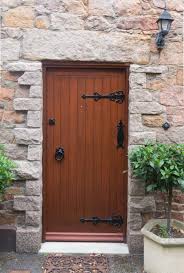
Very soon, all holiday let properties are going to be required by law to be keyless exit in case of emergencies. For properties with UPVC or similar doors where the handle needs to be pushed up before locking, the lock changes are straight forward and the existing cylinder just needs to be changed for one that has a thumb turn on the inside rather than a key.
But if you have a wooden door with a mortice (Chubb type) lock, then you will need a complete conversion kit consisting of replacement lock case, thumb turn cylinder and Euro cylinder handles. Most of this is straight forward, but sourcing handles to match your existing ones can be a drain.
If you do not get this work done and your tenants have an emergency, there will be no cover from your insurance should the worst happen due to them not being able to escape.
Here at AC Locksmiths Norfolk, we are happy to work around your changeover days and with your management company to get the locks changed seamlessly without hassle for you or your customers.
Should you require any more information, please contact me for an informal chat.
Common key & lock mistakes – And How To Avoid Them

It has been a while since I have produced a blog helping you to avoid needing to call out people like me. So here is a short list of common, avoidable mistakes people make that might just help you not make those same mistakes, hopefully saving you time and money.
Safe Keys
Putting override keys inside your battery operated safe: Safes are great, but if you have a key operated safe, the safe is only as good as the place you hide the key. People are quite obvious in hiding places, so digital safes are a lot better then simple key turn safes. The only problem is that digital safes have master key overrides and the safest place for these keys is in the safe itself. But if you only use your safe rarely there is a good chance you will forget about it, It gets placed in a built in cupboard, covered in clothes and out of sight, out of mind. The batteries start to die and because it is covered in clothes, you don’t hear the warning beep and pretty soon, you have a keypad that you cannot use. Thankfully, you have override keys…. But they are inside the safe. At this point, you can call a domestic locksmith who will gain access by destroying your safe and you will have to pay him for the privilege. You then have to buy a new safe. Potentially £100s because you forgot to change the batteries and left the override keys inside the safe. You can try a safe specialist to come and pick the lock, but the cost might still be £100s because safe specialists are rare (the courses and equipment are expensive) and they don’t get many calls compared to standard locksmiths.
How to avoid disaster? Firstly, take those override keys and trust a family member/good friend to look after them for you. If their house gets broken into and a burglar finds your safe keys, they have no idea what safe they open or where it is. But if they find those keys in your house, they can get into your safe. So, get those keys away from your property. Surprisingly, now your keys are not easily accessible in your safe, you will be more likely to check your batteries! But don’t rely on that. Check how long your safe manufacturer says batteries should last and halve it. Write on the calendar when to change the batteries. Use the old batteries for something else, but keep new batteries in your safe. I love Autumn and Spring because we change our clocks and this gives us a great time to do other things like regular battery changes. Have a list of other maintenance things to do like pre-winter gutter cleaning, etc, and put safe battery changes on that list. This will ensure that if you do have to call someone to open your safe, it will be because something has gone wrong rather than having to explain an expensive memory failure.
Car keys on holiday
I wish I had a sum of money for every time someone called me to say they lost their keys on the beach and the spare car key is 400 miles away on the other side of the country… Oh wait, I do! When you drive somewhere on holiday, take your spare key. When you get to your hotel/air B&B/caravan, etc leave your key somewhere safe at your destination. If you lose your car key, it will be a lot cheaper to get a bus/cab back to your holiday base than it will to call an auto locksmith to come and make a new key on the spot for you. A lot quicker too. Even when you go out on a normal day, if you have someone with you, get them to carry the spare key. If you bring the spare out and leave it in the glove box, you are making life difficult for everyone except car thieves.
Letter boxes
Sticking with cars, most cars are stolen from driveways or outside homes using the keys which have been lifted – either because the front door is left unlocked, or the thief has fished the keys through the letter box. Tools for opening locked doors via the letterbox are getting cheaper, easier to use, and ever more sophisticated. Even if you have an angled guard, there is a tool that goes around it. You might think this is a step back to your Grandma’s house, but a letter basket with closing lid, is a great way to foil the letterbox thief. Better still, seal up the letterbox, and have an external box. If you have room, get one that is big enough for parcels, We get so much delivered these days, a lockable parcel box is a great idea. At the same time, door cams record anyone approaching your door and will have images sent to your phone before they can vandalize it. But I digress..
Copy keys
If you are renting out a holiday home or have multiple carers, etc, get a locksmith to install a new lock, with all new, branded additional keys tried and tested before the lock goes in. Almost every time I get called back to job where the lock has failed, the customer shows me a key that has been copied elsewhere on some poor-quality blank. If you get keys copied and they foul up the lock, that is invalidating any guarantee the locksmith gives you, but if you are using additional keys supplied with the lock at time of installation, you are completely covered. But, if you must get copies made, make sure the original keys are the ones that get used most. I.E. let the guests use them. Yes, they might lose them (less likely if you request a deposit), but if they have poor quality keys and the lock fails and they are locked out waiting for a locksmith who destroys the lock getting in, the cost just multiplies. If you need multiple carers, please get a keysafe. It is better than having to collect keys later and ensures better keys are used.
5 lever locks
Know your terminology; there is a difference between a five lever mortice lock and a multipoint locking system. If you have a wooden door the mortice lock, (often called a ‘Chubb’ lock) is the one that should be 5 levers. If you look at the front plate, It will tell you that it is either 2, 3 5 levers and preferably will display a British Standard kite mark that tells you it has been tested against picking, drilling, sawing and most other forms of attack. If you have a door where you lift the handle and various hooks/bolts/mushrooms, etc. move, this is not a five lever lock. This is a multi-point locking system and your insurance is happy with that, which is bizarre because these systems are only as good as the locking barrel you put your key into and insurance companies are yet to wake up to how easy these can be to bypass. Again, digressing, but please talk to your local locksmith about kite-marked barrels. And if your architect/builder/designer tries to tell you these new multi-point doors without handles are a good idea, ignore them. When there is no handle, all the force of opening the door goes through the key. The leverage ratio is tiny compared doors with nice big handles, and at some point, you will snap your key in your lock.
Complacency
My last one for this blog; Just the other day, I fixed a basic lock on the top half of a stable door. It was not insurance compliant. When I challenged the customer regarding this and told him that his insurance company would not pay out if he were burgled, he replied with one I have heard often: ‘This is Norfolk. Although I know someone in the next village got burgled and lost a lot, it’s highly unlikely I will.’ So why pay for insurance at all? If you are paying for insurance, you owe it to yourself to make sure you are compliant. A second house this week is having three locks replaced after one has stopped working. I pointed out the three locks were all 3 lever and not insurance compliant, so the customer in this case, ordered new locks without delay. If you have an older house, don’t just assume the locks are up to spec. Most decent locksmiths do a free security check and, speaking for myself, when I do security checks I will tell you where advice is necessary and where advice is just personal recommendation.
This article about insurance required locks is quite good.
Should you have any questions regarding the above, please get in touch.
Thanks for reading
New Smart Ways to be secure

No, I’m not talking about locks linked to your smart speaker. As world events make everything more expensive I’m talking about ways to shop smart. I thought this as recently I upgraded the security on a home in a local new build estate. Soon, I had a neighbour asking on recommendation for the same upgrade. That turned into five properties, all occupied by people who knew each other. For me, it was multiple journeys to the same area, multiple measuring visits, multiple ordering from my supplier and multiple deliveries. Had these people clubbed together, I could have done all the work in one day. I would have measured up all the properties on the same day beforehand, thus saving myself costs that I would have passed on to the customer. Those customers could have saved themselves £50 each by clubbing together on the labour charge.
Home security is important, but like everything else, the cost is rising. So if you are thinking of upgrading your locks, putting in some CCTV or an alarm, talk to your friends, If they are local, I will happily split a labour fee between you if it means I save on massive fuel bills. I will visit both your homes (or more) for free security checks, tailor the hardware recommendations personally and then when the work is done, split the labour cost evenly between you.
What about giving security as a gift? We all know a relative that might have outdated locks, don’t we? Well, why not club together with family members and buy them a security upgrade? (It could make a nice change from pants and socks or bathroom smellies.) You would be getting them something they would be using every day for a long time to come. On my rounds, I see so many older folk struggling with doors that have floppy handles or need a ‘knack’ to make the key work. Next time you visit Mum and Dad, plan something worthwhile for their next birthday or Christmas.
And just in case you were wandering how far this locksmith will travel, I am happy to come to you in North Walsham, Aylsham, Fakenham, Cromer, Stalham, and all the places in between. I even venture into Norwich.
My security checks are always free and there is never an obligation to take up my quote. 1st homes or 2nd homes, holiday lets or commercial properties, your security is my business.
Thanks for reading.
Changing the locks on a brand new property
There seems to be a massive drive to build new homes lately. Almost everywhere you go, you are bound to be driving past a new build construction site. You might even be looking at a nice newly built home in your area, or even bought one. The beauty of a new home over an older one is that you can move in knowing you have nothing to do. The carpets are already fitted to your criteria, the sparkly kitchen gleams and there is no worry that some random neighbour has a spare key to your home, so why are we advising changing the locks on a brand new property?

Why change the locks?
Quite frankly, the developers will do the minimum possible to meet regulations, and currently in the UK the regulations just are not up to the same level as the burglars. New homes are all being built with multi-point locking mechanisms and while all the hooks, bolts and rollers look impressive and secure, the system is only as good as its’ weakest part, which is the locking cylinder. While standard locking Euro Cylinders are acceptable for insurance purposes, they are incredibly weak to a form of attack called ‘cylinder snapping’. Property developers will use these standard cylinders wherever possible.
Some of the more reputable developers will at least have the decency to install kite marked Euro cylinders in their doors, but beyond the kite mark, there are still three grades of security, which cover the three main forms of attack, those being snap, pick and drilling. So a cylinder with one star will be proof against picking but not the other two, and a cylinder with two stars will still be susceptible to attack by one of the three main methods. You can supplement the star rating by having anti-snap collars placed inside the handles, or anti-drill handles. You may even have these, but if you don’t know, then the burglar doesn’t know either and he is likely to have a go, fail and leave your door a mess before he leaves. Only a three star cylinder should be used if you want the burglar to go away before even trying.
With total honesty, there is a tool that can be purchased to bypass even some of the best three star cylinders, but it takes time use and is fiddly. Entry with this tool is trial and error, sometimes taking many minutes to get in the door, whereas a standard cylinder can be snapped in under 60 seconds with household tools and no sound. For the same reason a burglar will not take the time to remove your roof tiles and enter that way, he will not purchase a tool that takes him many times longer to get in than the cheap tools he can get from a DIY store.
Cylinder snapping is no longer about normal burglary any more; Intruders know that most people leave their car keys somewhere in the vicinity of the front door, be they left on a surface, hanging on a convenient hook, or just in a coat pocket. They can now look for the car they want to steal parked nicely on your front drive. As most of us are now two car families, at least one will sit on the drive, and if that car is your brand new Mercedes or BMW and you keep your keys close to an easily attacked door, your insurance might decide not to pay out because you didn’t take enough care. How many people tell their insurance the car is kept in the garage, knowing that actually the garage is full of the toot we don’t want in our actual houses? Breaking into a house and stealing the keys is now the easiest way to steal their car.
And while a barking dog is a deterrent to some degree, what protects your home when you are on holiday or even out walking that dog?
Most three star Euro cylinders are visibly different to standard cylinders. They shout at the burglar you are serious about home security and that attacking your home is going to be noisy and time consuming. Noise and time are the enemy of the burglar. If he knows breaking into your home is going to be noisy and take up precious time, he is going to move on. If you fit the proper cylinders, chances are you will be angry with the locksmith after years and years of never seeing any signs of attack. You will never know how many intruders scouted your home and mentally noted to leave you alone. It’s not hard. I help my kids with their paper round, and the best locks stick out like a sore thumb. I know exactly how few there are and where they are. A potential intruder only has to deliver some bogus leaflets in any area to work out who is best avoided.
While on this subject, an emailed question asked if it worth putting extra strength glue in an externally beaded window so that if the burglar got the beading off the window would still be stuck in place. Beading removal was never a hugely popular method of attack. There was always too much potential to make noise and take a long time. Also, the risk of breaking glass and then cutting oneself is too high, even without extra glues. Cylinder snapping is quick, quiet and easy. So faced with a choice, you should always upgrade your cylinders.
If you have standard cylinders or even kite marked one star cylinders, you should upgrade now. If you don’t know what you have, a good locksmith in your area will come and assess your locks via a free security check. Unless a locksmith has provided your locks, I very much doubt they will be the best on the market. You cannot buy the best locks in the DIY shops. While you are ensuring you have the best locks, you should be sending a copy of this information to everyone you care about, because of the following reasons:
- Burglary is on the rise.
- Traditionally ‘safe’ areas are being burgled more often.
- Only a tiny fraction of burglaries get investigated by police.
- You are now at risk from car thieves as well.
- Burglars pass on information to each other, so if you are burgled once, you stand an increased chance of being hit again.
- Every person I speak to who has experience a burglary, reports feeling of personal violation, sleepless nights and detachment from their home.
If you have any questions regarding the above information or any of the other blogs I have written, please get in touch via any of the methods on my contacts page.
Thanks for reading.
New build Holt, New build Fakenham, New build Aylsham, New build Cromer,
New build North Walsham, New Build Norfolk, Locks Holt, Locks Fakenham,
Locks Aylsham, Locks Cromer, Locks North Walsham, Locks Norfolk
What I have learned after 10 years as a Locksmith?
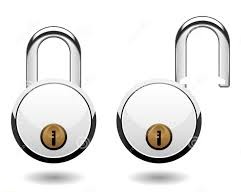
Lessons 10 years as a locksmith has taught me:
1. The multipoint locking mechanism on a double glazed door (or any door where you lift the handles before locking) is NOT a five lever lock. Five levers refers to the internal levers in a mortice lock which sits inside a wooden door.
2. All of those hooks, bolts, mushrooms, and rollers on a lift handle door mean nothing when burglars can attack the lock barrel easily. Having the correct barrel is vitally important and while you might get the insurance company to reimburse your financial loss, they cannot replace the heirloom given to you by Grandma that has enormous sentimental value. If your locking barrels do not have British Standard kite marks, you are practically inviting burglars into your home.
3. Home security is not necessarily about keeping intruders out. We all know they can smash a window. But they do not want to leave through that window carrying your stuff. You are looking to make it as hard as possible for them to leave with their arms full.
4. Look at your neighbour’s house when thinking about home security. Your aim should always be to make them look like an easier target. Crunchy gravel, CCTV, alarms, sensor lights are instant barriers before they even reach your door. Burglars recognise good locks and will go elsewhere. Your local locksmith knows the best brands you can’t buy on the high street.
5. That sneaky place you hide a spare key in the garden is glaringly obvious to the burglar. You are much better off with a quality keysafe.
6. You do not need multiple keys for carers. A keysafe can be much cheaper and easier for all. No more worries when keys go missing.
7. A home safe is not just about deterring criminals. A good one will protect important documents in the event of a fire. But batteries should be changed annually whether the low battery warning beeps or not, and override keys should be kept with a trusted neighbour or family member. Leaving the keys inside the safe is not a clever idea.
8. Taking your car on holiday? Make sure your partner takes the spare key. Nothing worse than calling a locksmith to open your vehicle when you lock the keys in the boot knowing a spare key is at home. Do not leave the spare key in the glove compartment.
9. Very few smart locks conform to BS3621, meaning they are not covered by your insurance.
10. Most lock failures can be avoided. If you notice your lock is getting harder to operate, or you have a special knack for opening the door, then something is wrong and needs addressing. It will be cheaper to sort now and if you don’t, the chances are it will fail when you are stuck in the pouring rain and are desperate to get in because you need to get ready for that important date/job interview/wedding/etc.
11. Hanging keys on a hook in plain sight of your door, or putting them in a dish/on a saucer near the front door is not good. Most luxury cars are stolen from drives after thieves use tools to hook keys through the letterbox. Seal the letter plate on your door and install a post box at the end of your garden. The postie and those who deliver your paper will love you for it.
12. Burglar alarms are not just about burglars; They now come with optional extras like smoke alarms and panic buttons allowing you to call a family member and talk to them through the system if you take a fall and cannot get back up.

13. Modern CCTV puts you in control. If you post images or film of a crime, the local community might help. A friend knew someone who did this when Christmas decorations were stolen from their garden. The theft was captured by a smart doorcam and posted. Locals soon identified the thief and the stolen items were returned (along with a box of chocolates!).
14. If you need to get copies of keys made, still use the originals as your primary keys. Ask your local key cutter to order genuine branded blanks, even if it costs more and you have to come back. 90% of my recalls for faulty locks end up being poor copies not working properly. When you order a new lock, think about the number of keys you need, and order them at the same time. If you need more than four extra keys, a keysafe can be cheaper.
15. Plastic doors are just as prone to weather conditions as wooden doors. Be aware of direct sunlight and salty sea air. Check regularly for signs of rust. Lubricate your doors every time you change your clocks (spring and autumn). You can find out how by reading my blog on door maintenance.
16. The industry recommends changing your locks every 5 years, especially when keys have been handed to builders, carers, lost by teens, etc. While 5 years might seem a bit too much, adult children might do well to check their older parents’ locks. Many older houses are simply not up to insurance standard. If you cannot find a British standard kite mark on their lock, they are probably paying insurance for nothing as the insurers will not pay out in the event of a burglary.
17. Making a new car key when you have one to copy from is much cheaper than calling out the emergency locksmith when you are stuck in the rain and locked out of your vehicle because you just dropped your car key down a drain. And some cars, like Fords, will require you to make two new keys when all keys are lost as the car will not start without two keys programmed and the process automatically deletes all existing keys.
18. Cloning a car key means any lost/stolen keys will still start your vehicle. Making new keys allows you to ensure only the keys you hold will start the vehicle.
19. Car keys have a huge difference in prices from vehicle to vehicle for many reasons. Some can only be reproduced with genuine branded parts. Others require the removal of the dashboard in order to read a certain computer chip. While most can be done on the day, you might find yourself without the use of your vehicle for some time. Another reason to have a spare key made when convenient rather than leave it to an emergency.
20. Everything comes in all shapes and sizes. Locks are no different. Beware of what you buy in shops or on the internet as they might not be the easy DIY job you were expecting. Always consult a professional locksmith. For example, lots of internet-based car key makers advertise Landrover Discovery keys, but these can only be produced by the manufacturer. In the home, only Chubb branded locks fit exactly into the place where a Chubb lock has been before. Any other brand will need carpentry work and movement of handles (which might expose paintwork that needs touching up that might lead to the painting of the whole door, meaning a quick job becomes a whole day event).
Thanks for reading. Please call us to find out more or ask any questions.
07846643176











